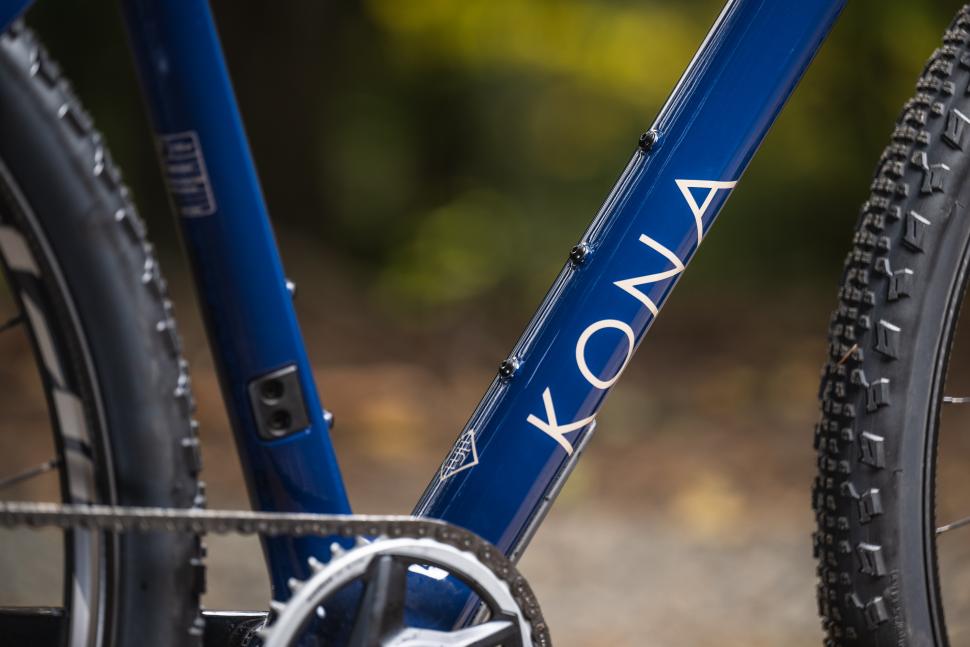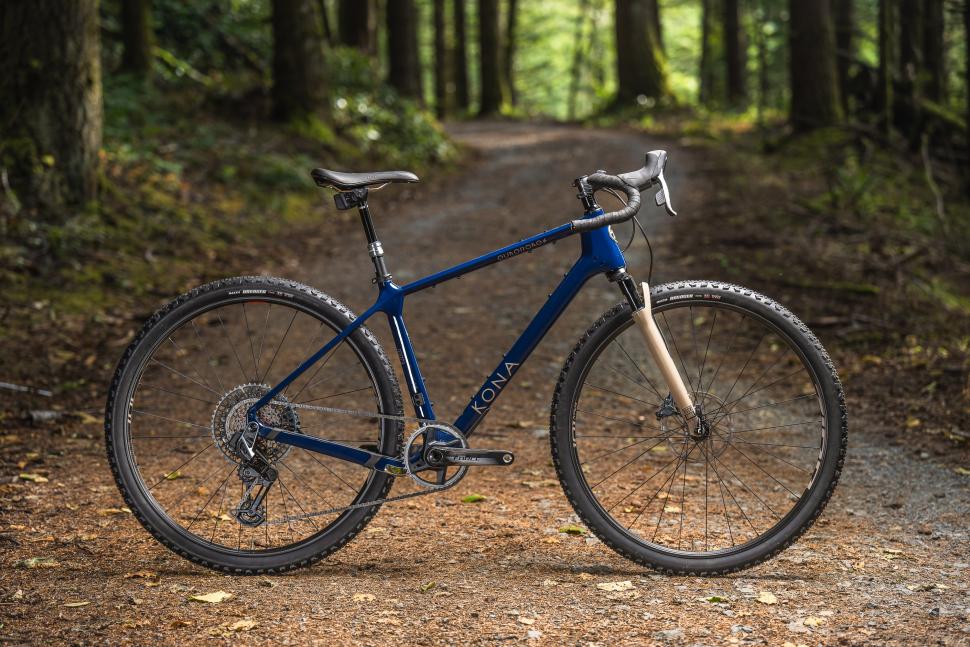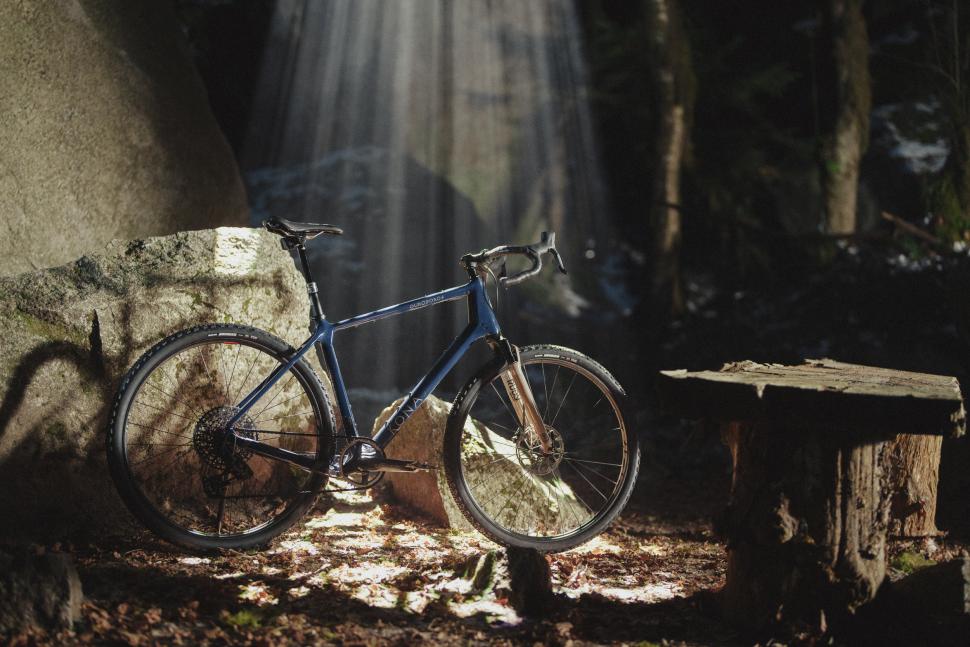- News
- Reviews
- Bikes
- Components
- Bar tape & grips
- Bottom brackets
- Brake & gear cables
- Brake & STI levers
- Brake pads & spares
- Brakes
- Cassettes & freewheels
- Chains
- Chainsets & chainrings
- Derailleurs - front
- Derailleurs - rear
- Forks
- Gear levers & shifters
- Groupsets
- Handlebars & extensions
- Headsets
- Hubs
- Inner tubes
- Pedals
- Quick releases & skewers
- Saddles
- Seatposts
- Stems
- Wheels
- Tyres
- Tubeless valves
- Accessories
- Accessories - misc
- Computer mounts
- Bags
- Bar ends
- Bike bags & cases
- Bottle cages
- Bottles
- Cameras
- Car racks
- Child seats
- Computers
- Glasses
- GPS units
- Helmets
- Lights - front
- Lights - rear
- Lights - sets
- Locks
- Mirrors
- Mudguards
- Racks
- Pumps & CO2 inflators
- Puncture kits
- Reflectives
- Smart watches
- Stands and racks
- Trailers
- Clothing
- Health, fitness and nutrition
- Tools and workshop
- Miscellaneous
- Buyers Guides
- Features
- Forum
- Recommends
- Podcast
news
 Kona Ouroboros gravel bike 2
Kona Ouroboros gravel bike 2Kona Bicycles bought back by founders, month after mass job cuts as former parent company abandoned struggling bike industry
Kona Bicycles, which just last month was in the process of winding down after a chaotic 24 hours which saw extensive job cuts and the brand’s stall swifty and ominously taken down at the Sea Otter Classic Event, has been bought back by its founders, who say the company is “returning home to its roots”.
Dan Gerhard and Jake Heilbron, who co-founded the Vancouver-based off-road specialist bike manufacturer in 1988 alongside Jimbo Holmstrom, announced this week that they have repurchased the company from Kent Outdoors, a Canadian sporting goods conglomerate which bought Kona in 2022, but who last month confirmed it was seeking a buyer for the brand after announcing its desire to move away from a bike industry still facing “very significant challenges”.
In April, reports of a winding down process and mass lay-offs emerged after Kona staff members were spotted taking down the brand’s stall at the Sea Otter Classic, less than 24 hours after setting it up, followed by a ‘town hall’ meeting confirming the job cuts.
But this week, in a statement announcing their return to Kona, and with it the company’s effective rebirth, Gerhard and Heilbron said they are reuniting with a team of “dedicated, experienced” Kona employees to bring the company “back to basics”.
According to the two founders, the resurrected Kona will focus on renewing its relationship with dealers and retailers in North America and Europe, pausing its direct-to-consumer service on its website, and unveiling a new range of bikes at competitive prices.
The statement reads:
Kona Bicycles has been in the news lately. We’d love to say that it’s because the new Ouroboros is blowing everyone’s minds (because it really is that good), but truthfully, it has been a bumpy couple of years. So, it’s time to print a positive headline: Kona is returning home to its roots.
With this return to being rider-owned and operated, we’re doubling down on our unique brand legacy and getting back to some basics.
Renewing relationships with our nearly 1000-strong North American and European dealer network is our highest priority. Most of us started out in bike shops, and in our eyes, IBDs are our strongest advocates and allies. Healthy retailers are integral to making sure that Kona fans everywhere experience the ride of a lifetime.
To best honour our dealer relationships, we are pausing D2C for all bikes. Konaworld.com will show changes to reflect this, and our social and communications channels will be getting reworked as well once we get things rolling. Bear with us, and we will keep you informed as we move through this transition.
On the bike side, new Kona inventory is headed to our warehouse and distributors, and alongside the freshly released Ouroboros, we’ve got some incredible bikes in the pipeline that we are looking forward to unveiling. We’re beyond grateful for the support that our suppliers have shown us in this endeavour. Vendors like Fairly Bikes, who have been with us since our first bike in 1988, are a testament to the value of longstanding relationships where people take care of people.
In more good news, we are now positioned to price our bikes much more competitively. Private ownership allows us to be more streamlined, more flexible, and quicker on our feet. This, combined with the support of our suppliers, means we can deliver high quality bikes in a distinctly Kona flavour at super attractive prices. We’ll never do a BOGO Sale again, so don’t ask, but we promise to offer good value for good money, always.
We are back. We are still here. Let’s ride… Welcome back to the smallest biggest bike company in the world.
As noted above, Gerhard and Heilbron’s decision to buy Kona back after two years away comes after Kent Outdoors, following a “strategic review” of its business, chose to abandon a bike industry which it believes will take another two years to fully recover from the challenges that have wreaked havoc on it in the post-Covid period.
> Kona Bicycles winding down and up for sale as parent company abandons struggling bike market
“In connection with the investment of capital and the management team coming onboard, the company performed a strategic review of its operating units and determined that it would continue to seek a buyer for its bike business, Kona,” the Kent Outdoors press release said.
“This move allows the company to direct its resources toward investment in its key water sports businesses. The bike industry has faced very significant challenges in the post-Covid world and Kona has not been immune to these headwinds.”
An anonymous source from within the company also said last month that Kent believes that the global cycling industry is unlikely to fully recover from its current struggles for 18 months to two years, and that they are not prepared to wait that long. Kent therefore decided to step away from the bike sector to focus on its existing water sports brands, where recovery is already underway.
However, Scott Taylor, the owner of Lancashire-based distributor Mount Green Cycles – who continued to import and distribute Kona bikes into the UK market despite the winding down reports – instead pinned the blame for the manufacturer’s troubles on Kent Outdoors’ policies and decisions, and not Kona’s bike sales or the cycling market in general.
Taylor claimed that due to Kent Outdoors slowing their supply chains over the past year as they considered the brand’s future, there is – instead of the overstocking dominating the bike industry during this turbulent post-pandemic period – a shortage of some Kona models, with some dealers putting in back orders for certain models.
After obtaining a PhD, lecturing, and hosting a history podcast at Queen’s University Belfast, Ryan joined road.cc in December 2021 and since then has kept the site’s readers and listeners informed and enthralled (well at least occasionally) on news, the live blog, and the road.cc Podcast. After boarding a wrong bus at the world championships and ruining a good pair of jeans at the cyclocross, he now serves as road.cc’s senior news writer. Before his foray into cycling journalism, he wallowed in the equally pitiless world of academia, where he wrote a book about Victorian politics and droned on about cycling and bikes to classes of bored students (while taking every chance he could get to talk about cycling in print or on the radio). He can be found riding his bike very slowly around the narrow, scenic country lanes of Co. Down.
Latest Comments
- webbierwrex 26 min 10 sec ago
Lake's sizing is all over the place. I have two MX237s that fit differently (despite being the same size). I also have a pair of CX238s but am...
- Louis Wells 43 min 18 sec ago
it would be funny if a judge could ban the passenger from driving (if licenced) and give them an asbo preventing them form being a passenger in a...
- Rendel Harris 1 hour 10 min ago
The approving tone of the coverage there is rather worrying, no? Even describes their decision to screw it to the garden shed as "ingenious"....
- quiff 1 hour 18 min ago
I know this isn't the point, but lots of supermarkets will now take plastic bags for [some form of recycling] whereas at my council site, they'd...
- mark1a 1 hour 25 min ago
Posting them here in the comments six times a day is just excessive anyway.
- Creakingcrank 2 hours 1 min ago
I use a cheap motorcycle dashcam on my e-bike (~£100 for 2 cameras and a common recording box). Comes with a wired remote that I don't bother with....
- the little onion 6 hours 20 min ago
The other thing about the changes in Paris is that it is just so much more pleasant than it was before. Not only is the air cleaner, but the...
- Rendel Harris 9 hours 45 min ago
She may have a disability and have the car through Motability. She may have recently lost her job and the car dates from more prosperous times. For...


Add new comment
6 comments
I've seen firms in other sectors being bought by investment companies. It rarely ends well. I spoke with the president of one such firm that'd been owned by an investment company and one thing he said of note was that the investment firm didn't invest at all. He said everbody was glad when the firm was finally bought out by a rival, which understands the sector and started reinvesting in R&D and the production facilities that'd been neglected by the (lack of) investment company.
This is surely good news for customers. Cyclists rather than investment corporations owning bike companies has to be good for quality, value and innovation.
I would agreed. Also re-inforces the silly decisions being made by people who lack understanding of an industry or a sector but have an abundance of cheap debt to splurge.
Does anyone except the investment corporation get any benefit? Any at all? It seems like the investment corporation moves in, loads the subject up with as much debt as they can while extracting as much dividend as they can, and then sells up and moves on once the subject business has (inevitably?) gone bust.
That's exactly their plan. It's Capitalism finding the most efficient way to destroy things.
I would think that Kent Outdoors have probably taken a hit financially - as the company was (presumably) in good financial shape when they bought it but is now struggling it would be crazy if the purchasers paid more for it than KO. Or agreed to take on all the debt as part of the deal. But then I was a modestly successful business owner, so what would I know about debt, dividends and bankruptcy??